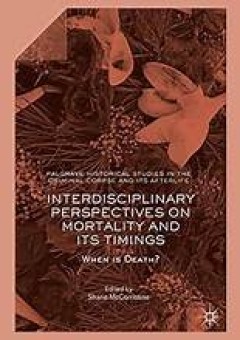Filter by

Continental Philosophy of Technoscience
The key objective of this volume is to allow philosophy students and early-stage researchers to become practicing philosophers in technoscientific settings. Zwart focuses on the methodological issue of how to practice continental philosophy of technoscience today. This text draws upon continental authors such as Hegel, Engels, Heidegger, Bachelard and Lacan (and their fields of dialectics, p…
- Edition
- -
- ISBN/ISSN
- 978-3-030-84570-4
- Collation
- VII, 245
- Series Title
- Philosophy of Engineering and Technology (POET, volume 38)
- Call Number
- 500 ZWA c

Conservation of Contemporary Art : Bridging the Gap Between Theory and Practice
This open access book investigates whether and how theoretical findings and insights in contemporary art conservation can be translated into the daily work practices of conservators or, vice versa, whether and how the problems and dilemmas encountered in conservation practice can inform broader research questions and projects. For several decades now, the conservation of contemporary art has be…
- Edition
- 1
- ISBN/ISSN
- 9783031423574
- Collation
- VIII, 401 hlm,: ill, lamp;
- Series Title
- 9
- Call Number
- -

Reality Lost: Markets of Attention, Misinformation and Manipulation
This open access book looks at how a democracy can devolve into a post-factual state. The media is being flooded by populist narratives, fake news, conspiracy theories and make-believe. Misinformation is turning into a challenge for all of us, whether politicians, journalists, or citizens. In the age of information, attention is a prime asset and may be converted into money, power, and influ…
- Edition
- 1
- ISBN/ISSN
- 9783030008130
- Collation
- XXII, 144hlm; ill., lamp.,
- Series Title
- -
- Call Number
- -

Anxiety as Vibration
This open access book draws on the work of Deleuze and Guattari alongside Lacan and Freud to offer a radical psychosocial survey of the status of anxiety. Taking a multidisciplinary approach, the book examines key issues in contemporary diagnosis and points towards possibilities for forging a more creative clinic. Departing from a feminist, non-Oedipal positioning towards psychoanalytic texts, …
- Edition
- 1
- ISBN/ISSN
- 978-3-031-62856-6
- Collation
- oer.unej.ac.id
- Series Title
- Studies in the Psychosocial
- Call Number
- 155

A Climate of Justice: An Ethical Foundation for Environmentalism
This open access book helps readers combine history, politics, and ethics to address the most pressing problem facing the world today: environmental survival. In A Climate of Justice, Marvin Brown connects the environmental crisis to basic questions of economic, social, and racial justice. Brown shows how our current social climate maintains systemic injustices, and he uncovers resources for ch…
- Edition
- -
- ISBN/ISSN
- 978-3-030-77363-2
- Collation
- XIX, 185
- Series Title
- Library of Public Policy and Public Administration (LPPP, volume 16)
- Call Number
- 320 BRO c

Happiness is the Wrong Metric : A Liberal Communitarian Response to Populism
This book is open access under a CC BY 4.0 license. This timely book addresses the conflict between globalism and nationalism. It provides a liberal communitarian response to the rise of populism occurring in many democracies. The book highlights the role of communities next to that of the state and the market. It spells out the policy implications of liberal communitarianism for privacy, f…
- Edition
- -
- ISBN/ISSN
- 978-3-319-69623-2
- Collation
- XXI, 304
- Series Title
- Library of Public Policy and Public Administration (LPPP, volume 11)
- Call Number
- 320 ETZ h

Cultural Representations of Gender Vulnerability and Resistance
This Open Access book considers the cultural representation of gender violence, vulnerability and resistance with a focus on the transnational dimension of our contemporary visual and literary cultures in English. Contributors address concepts such as vulnerability, resilience, precarity and resistance in the Anglophone world through an analysis of memoirs, films, TV series, and crime and liter…
- Edition
- 1
- ISBN/ISSN
- 978-3-030-95508-3
- Collation
- oer.unej.ac.id
- Series Title
- Thinking Gender in Transnational Times
- Call Number
- -

Interdisciplinary Perspectives on Mortality and its Timings
This book is open access under a CC BY 4.0 license. This volume provides a series of illuminating perspectives on the timings of death, through in-depth studies of Shakespearean tragedy, criminal execution, embalming practices, fears of premature burial, rumours of Adolf Hitler’s survival, and the legal concept of brain death. In doing so, it explores a number of questions, including: how …
- Edition
- 1
- ISBN/ISSN
- 978-1-137-58328-4
- Collation
- -
- Series Title
- Palgrave Historical Studies in the Criminal Corpse and its Afterlife
- Call Number
- -

The Life of Breath in Literature, Culture and Medicine
This open access book studies breath and breathing in literature and culture and provides crucial insights into the history of medicine, health and the emotions, the foundations of beliefs concerning body, spirit and world, the connections between breath and creativity and the phenomenology of breath and breathlessness. Contributions span the classical, medieval, early modern, Romantic, Victori…
- Edition
- 1
- ISBN/ISSN
- 978-3-030-74443-4
- Collation
- -
- Series Title
- Palgrave Studies in Literature, Science and Medicine
- Call Number
- XXII, 555

The Ethics of Vaccination
This open access book discusses individual, collective, and institutional responsibilities with regard to vaccination from the perspective of philosophy and public health ethics. It addresses the issue of what it means for a collective to be morally responsible for the realisation of herd immunity and what the implications of collective responsibility are for individual and institutional respon…
- Edition
- 1
- ISBN/ISSN
- 978-3-030-02068-2
- Collation
- -
- Series Title
- Palgrave Studies in Ethics and Public Policy
- Call Number
- 2946-2746
 Computer Science, Information & General Works
Computer Science, Information & General Works  Philosophy & Psychology
Philosophy & Psychology  Religion
Religion  Social Sciences
Social Sciences  Language
Language  Pure Science
Pure Science  Applied Sciences
Applied Sciences  Art & Recreation
Art & Recreation  Literature
Literature  History & Geography
History & Geography